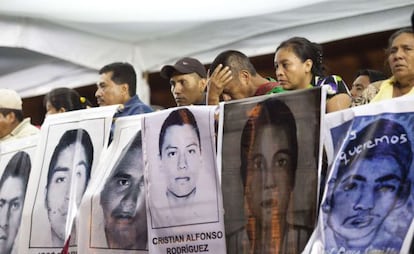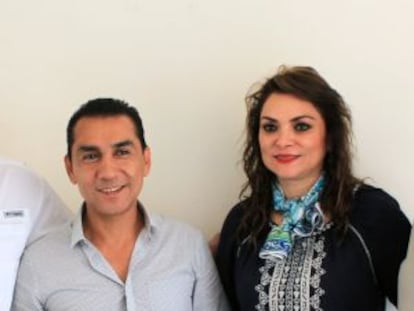The pain that has no name
Only one thing can help the families of the 43 missing Mexican students: to know the truth


He says ¡°desperate¡± and speaks of ¡°the government.¡± He says ¡°hopeful¡± and he speaks of ¡°the government.¡± He says ¡°anxiety¡± and he speaks of ¡°the government.¡± As Nardo Flores, the father of Bernardo, one of the 43 missing students from Ayotzinapa, shares his feelings, he keeps repeating that everything depends on the government.
Flores and other relatives are suffering as a result of these disappearances in which public authorities were involved. They do not know if their love ones are alive or dead. They are not exactly sure by whom or why they were taken, but they know that members of the government, local police officers, participated in the abduction. And that they depend on the state to find out the truth.
I understand what the people in Ayotzinapa are feeling. But I don¡¯t know the word to describe it¡± Julieta Gonz¨¢lez, mother of kidnap and murder victim J¨¦nifer Robles
Spanish psychologist Carlos Beristain has been working in Latin America on these kinds of cases for 25 years. He described the nature of the crime in question to EL PA?S this week via email. ¡°Abduction is probably the most sinister form of violence,¡± he wrote from Colombia. ¡°It involves a form of psychological torture for the families. On the one hand, they want them to turn up, even if they are dead, and on the other, they are hoping they don¡¯t turn up because maybe they are still alive and they are pleading for their lives with the authorities. It¡¯s a psychological situation that involves a double-edged sword because any way out means a new shock and, as the days or weeks pass, it only grows.¡±
Nardo Flores is calling from the Escuela Normal de Ayotzinapa, the college that the student teachers attended and where their families are waiting for them. He says that since the incident occurred on September 26, his state of mind has gone from shock to an obsession with getting answers. ¡°More and more, the pain is turning into rage against the government. The tears won¡¯t stop. Now a more aggressive feeling has set in.¡±
The families have refused the government¡¯s offer to provide them with psychological support. A civic organization, Fundar, is helping them instead. Psychologist Ximena Antill¨®n is often with them at the school. She says the relatives are ¡°dealing with uncertainty¡± and are highly affected by rumors. ¡°They are very vulnerable to that. For example, there was a photograph of [Mexican President Enrique] Pe?a Nieto with some people who have been arrested circulating on the internet. But it was fake. It was edited together and, even so, it worried the parents a lot.¡±
Carlos Beristain, psychologist
More and more, the pain is turning into rage against the government¡±
Nardo Flores, father of missing student
According to official records, around 30,000 people are missing in Mexico. Many cases are not reported in the media. Only the most sensational ones, if they ever come to light, get any coverage.
Such was the case with the 13 youngsters who were kidnapped in May 2013 in Mexico City and whose mutilated bodies were found in a mass grave three months later. Julieta Gonz¨¢lez, the mother of one victim, J¨¦nifer Robles, says the worst came after her daughter¡¯s death had been confirmed. ¡°Before they identified her, I had hope,¡± she recalls. ¡°I imagined they would all come back dirty, covered with lice, in rags, and very thin, but no, you see the way they returned my daughter to me. Now I don¡¯t care if the sun rises or sets. Everything annoys me. I go out to work and the noise of the trucks bothers me. The TV bothers me. They have already broken my heart and now I¡¯m doing nothing more than surviving. They destroyed everything I had. I understand what the people in Ayotzinapa are feeling. But I don¡¯t know the word to describe it.¡± Gonz¨¢lez is 52 years old and lives in Mexico City. She has six grandchildren in her care and works as a peddler, selling teddy bears.
Beristain describes the impact of the disappearances as ¡°a kind of limbo about which they cannot even talk. There is no status associated with this pain.¡± ¡°The cure,¡± he says, is for those affected to help one another with the support of professionals and to try to find justice. ¡°What the relatives need is the truth.¡±
Alejandra Gonz¨¢lez, an independent consultant for victims, has experience with different types of cases. She describes the relatives¡¯ state of mind as they live with the uncertainty: ¡°There is a repetitive thought about whether they are alive, cold, hungry, hurting, whether they are in a situation of forced labor, whether they are kept as captives or whether they want them for something else. It¡¯s a chain of fears that produces anxiety because the imagination takes off. What¡¯s needed is a space to be heard, not so much individual therapy. Spaces for exchange, for the mothers and fathers to see others going through the same situation, mirroring them. And to not try to cut off the process. It¡¯s better to let it flow, to work with fantasies. It¡¯s important to talk about all the possibilities, even the cruelest ones.¡±
Nardo Flores says he sleeps ¡°on and off¡± and that he has lost his appetite. Though he feels he is ¡°in hell,¡± he also says he will stay in that hell for ¡°however long is necessary¡± for him to find his son ¨C alive or dead ¨C and until he knows what happened.
¨CHave you felt any peace during these 40 days?
¨CTo tell you the truth: no.
Translation: Dyane Jean Fran?ois
Tu suscripci¨®n se est¨¢ usando en otro dispositivo
?Quieres a?adir otro usuario a tu suscripci¨®n?
Si contin¨²as leyendo en este dispositivo, no se podr¨¢ leer en el otro.
FlechaTu suscripci¨®n se est¨¢ usando en otro dispositivo y solo puedes acceder a EL PA?S desde un dispositivo a la vez.
Si quieres compartir tu cuenta, cambia tu suscripci¨®n a la modalidad Premium, as¨ª podr¨¢s a?adir otro usuario. Cada uno acceder¨¢ con su propia cuenta de email, lo que os permitir¨¢ personalizar vuestra experiencia en EL PA?S.
En el caso de no saber qui¨¦n est¨¢ usando tu cuenta, te recomendamos cambiar tu contrase?a aqu¨ª.
Si decides continuar compartiendo tu cuenta, este mensaje se mostrar¨¢ en tu dispositivo y en el de la otra persona que est¨¢ usando tu cuenta de forma indefinida, afectando a tu experiencia de lectura. Puedes consultar aqu¨ª los t¨¦rminos y condiciones de la suscripci¨®n digital.









































